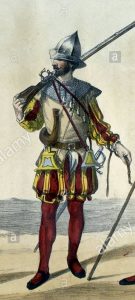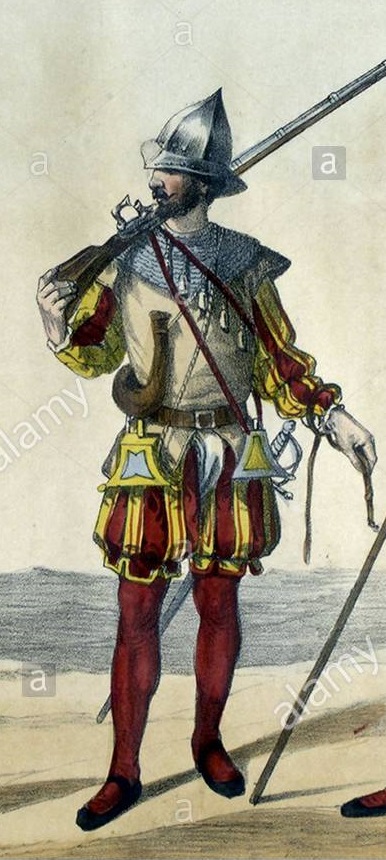Edward Latham’s sworn oath brother
First is the Spanish officer who becomes his oath-brother. Latham had brought urgent intelligence to the Spanish army about a French Huguenot army approaching to break the Spanish siege Mons. Sentries mistook Latham for a rebel saboteur and were preparing to kill him. Here’s your first glimpse in Chapter 4 of this fictional man:
‘Don Cristobal Covarrulejo d’Avila, newly appointed sergeant-major of the Eleventh Company, jerked awake. Had he dreamed gunshots or heard them? His head pounded with a hangover from last night’s wine. He leapt out of bed and ran to the close stool, just ahead of heaving up fatty duck and jets of pinkish liquid. That’s right, he remembered. I’m the new commander of the Eleventh Company, a group tainted by the corruption of its prior sergeant-major.
“The usual sordid stupidity,” his colonel had said as he signed Don Cristobal’s commission. “Gutierrez invoiced for a full complement when a third of his men were dead. He spent the company’s money while his men scrounged for scraps, even sold their physic to pay whores. It all came to light when he was ordered to Mons where he might have to fight. The rogue bleated for reinforcements! Probably he acted alone; his men certainly suffered. But a taint clings to them. The Eleventh Company needs a hard straight commander with warrior lineage. You can keep Gutierrez’ page and halberdiers until yours arrive.”

Don Cristobal wiped his mouth with the sleeve of his nightshirt. Well, he thought, he’d meet his men today, assume command tomorrow. Feeling better, he washed his face and sat on the bed. There was banging at the siege works. A bell rang, and the noise sputtered then stopped. Midday break. In the stark silence, he heard voices in the field, quite close. He picked out the word noose.
Jumping up, he opened the tent’s flap. The vast field was almost deserted, other officers being at the siege works.Only a few washerwomen and stable boys were around. They were staring at something. Don Cristobal stepped outside. Three men with drawn swords were pushing, prodding and dragging another man across the field. A priest was striding with them, robe flapping and talking at the prisoner’s ear. The prisoner was being hustled towards a tree across the road with one bare branch. A man was stringing a rope around the branch.
A hanging! Who were these men? Don Cristobal opened a box and took out three tin tubes, each one of a different thickness. He hadn’t tried this device yet, having confiscated it from a Dutch apothecary just two days ago. The Dutchman was executed for refusing to pay the tenth penny tax. The tubes, which had double reflecting glass pieces, were supposed to bring distant images closer when fitted together. Don Cristobal felt vaguely ashamed as he remembered the apothecary’s children clutching a soldier’s breeches as they dragged the father away. The apothecary had tried to barter the device, which he called a looker, for his life. But Don Cristobal had no authority to negotiate. Enough daintiness, he thought, thrusting guilt aside. He was a hard straight man, as the colonel said; the apothecary was a rebel, tax cheat and heretic. Still, he regretted the children’s loss.
He fitted two tubes together and looked through the glass. All blurred. His stomach heaved. He took a deep breath, substituted tubes and tried again. Suddenly a scratch in the leather of one man’s jerkin nearly smacked his eyeball. He jumped back amazed, then looked again. God Almighty, the thing worked! He could make out horizontal green threads, horizontal white threads and red diagonal ones. Red diagonal cross on green and white stripes: the man was an Eleventh Company soldier. He put the device down. Knowing what to look for, he made out with his naked eyes the same colours on all of them.
His men.
Then who was their prisoner? He looked through the tubes again, and a section of dusty grey cloak swam into view. The weave was first class. He shifted the tube to the man’s shirt. Its black work collar was equally fine, if soiled. This device was cumbersome, but it had shown him what he needed to see. His company, tainted by corruption, was about to hang a man of consequence. Maybe they were right, but he had to make sure. He thrust the tubes under his sheets, dragged on shirt, hose, boots, and shrugged into his corselet with its new red cross on green and white stripes. Grabbing his letter of appointment, he ran.’

